Will There Be a Voting Rights Betrayal?
By Ashahed M. Muhammad -Asst. Editor- | Last updated: Jun 18, 2013 - 11:33:17 AMWhat's your opinion on this article?
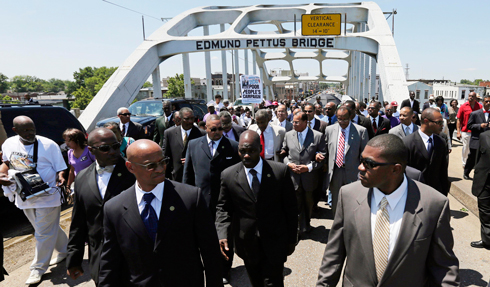
The Honorable Minister Louis Farrakhan joins others in a march across the historic Edmund Pettus Bridge in Selma, Ala., on a voting rights caravan across Alabama on June 14. Min. Farrakhan also spoke at rallies in Birmingham, Columbiana and Montgomery. Photo: AP/Wide World photos
|
'It's time to stand up!'
Remembering the martyrs, demanding justice as voting rights pilgrimage and caravan presses for action on a pivotal issue for Black America
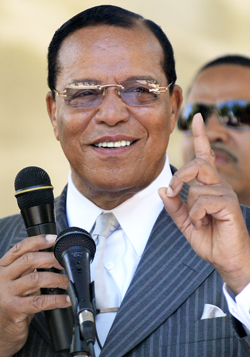
Minister Louis Farrakhan speaks in Kelly Ingram Park in Birmingham, Ala., June 14. He and others made several stops across Alabama to encourage the U.S. Supreme Court to save a major portion of the Voting Rights Act. Photo: AP/Wide World photos
|
It was a sweltering hot day June 14 with high levels of humidity and temperatures reaching into the mid-90s, but that did not matter. The spirit and legacy of the Freedom Riders of the civil rights era and modern demands to protect the Black right to vote were front and center during four back to back rallies.
Minister Farrakhan landed at Birmingham-Shuttlesworth International Airport that morning and was immediately received by Nation of Islam Southern Student Regional Minister Abdul Sharrieff Muhammad and Student Regional Captain Oliver Muhammad.
Birmingham Mayor William A. Bell was very instrumental and accommodating to organizers of the mid-June pilgrimage and stops at historic places of struggle and sacrifice in Alabama. Due to the serious illness of his mother, however, Mayor Bell was unable to participate in the pilgrimage as planned.
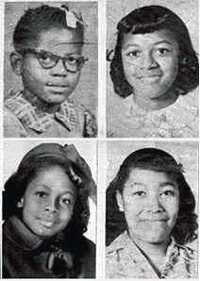
The four girls killed by the 16th Street Baptist Church terrorist bombing. Clockwise from top left Addie Mae Collins (aged 14), Cynthia Wesley (aged 14), Carole Robertson (aged 14) and Denise McNair (aged 11).
|
The park also holds special significance as the place where civil rights icon Rev. Martin Luther King, Jr. and movement leaders like James Luther Bevel and Fred Shuttlesworth of the Southern Christian Leadership Conference organized protests and demonstrations.
While outright denial and brutal intimidation were tools yesterday, today threats are not overt but consist of conservative forces trying to limit or take away Black voting rights through legal maneuvers and technicalities, said advocates who want Justice Dept. approval of changes by certain states to remain intact. At Final Call presstime, the U.S. Supreme Court was considering whether enough progress had been made to lift the requirements.
As noted by the National Constitution Center, the historic Supreme Court decision heralds back to February arguments in the case of Shelby County v. Holder. “Shelby County, Alabama, filed suit in district court, claiming that Section 5 and Section 4(b) of the Voting Rights Act are unconstitutional. Two courts then ruled that those sections were constitutional,” the center noted.
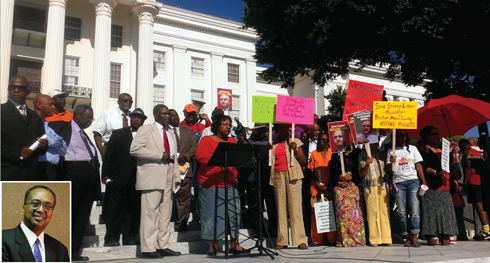
Victoryland supporters join the Save Section 5 Voting Rights caravan on the steps of the Alabama state capitol. (Insert) Dr. Charles Steele, CEO of the Southern Christian Leadership Conference (SCLC)
|
“Section 5 prohibits selected districts and states from changing their election laws and procedures without getting official approval from the federal government. Section 4(b) defines the districts as having had a voting test in place as of November 1, 1964 with less than 50 percent turnout for the 1964 presidential election,” the center added. The high court had at least six major cases to announce with just three announcement days left in June at Final Call presstime June 17.
“During those February hearings, the conservative majority of the Supreme Court didn’t appear to be swayed by arguments by the Obama administration to keep the ‘preclearance’ requirement in Section 5 of the law. That provision requires all or parts of 16 states, including virtually the entire Southern region of the United States, to get Justice Department approval before changing election districts, voting rules, and polling locations,” the National Constitution Center said.
New tactics, same aims of control?
State Representative Merika Coleman of District 57 in Birmingham got the crowd fired up as she described the right wing efforts to disenfranchise Black voters as “old poison in a new bottle.”
Decades ago, poll taxes, literacy laws and physical intimidation were used to keep Blacks from voting. Today, political leaders and activists declared, voter identification laws, changing early voting times or dates, revamping voter registration laws and changing polling locations, are modern tools used to suppress the Black vote.
“I think we’re locked and loaded today ready to protect the Voting Rights Act,” said Rep. Coleman. “We won’t go back,” she said defiantly.
The Minister set the tone for the day’s events, saying those who claim the King legacy must never allow him to be limited to the slogan “I have a dream.” If Dr. King still lived, the Minister said, we would be side by side fighting for justice.
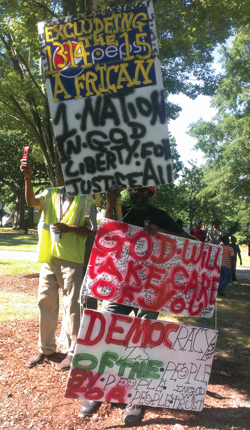
In Birmingham, this Voting Rights Act supporter held signs while another captured the atmosphere in Kelly Ingram Park with video on his cell phone. Photos: Ashahed M. Muhammad
|
During each stop, the Minister read from an August 15, 1967 document presented by Dr. King titled “The Crisis in America’s Cities.” Dr. King provided an analysis of social conditions at that time, and a solutions-oriented plan of action to eliminate poverty, racial discrimination and racism in American cities. (See related article, page 20.)
The days of passively being disenfranchised are over, and it is up to the people to determine that there will be enforcement of the laws of the land, said Min. Farrakhan. No longer should Blacks allow themselves to be subjected to endless litigation for basic civil rights, he added.
“We are here at this sacred place, across from the hallowed place where those beautiful children lost their lives that we might live. Jimmie Lee Jackson died that we might live. Medgar Evers died that we might live, Booker T. Washington died that we might live. Malcolm X and Martin Luther King died that we might live,” said the Minister. “So what are we going to do standing on their shoulders? We must not weaken in an hour like this. We must neither tremble nor shake because a law is no law at all if there is no will on the part of those who make the law to enforce that law.”
He reminded the audience that Dr. King believed “it is a mockery to call it a law if it is unenforced.”
“So to cut out Section Five of the Voting Rights Act is to take out the enforcement to make sure that the recalcitrance of some of those, who never wanted us to vote in the first place, would now be free to keep us going back and forth to court, litigating, litigating and litigating—to hell with litigation!”
Remembering the martyrs
Along the caravan route, many invoked the names of slain civil rights martyrs such as Jimmie Lee Jackson, killed in Marion, Ala.; James Reeb, killed in Selma, and Tuskegee where activist Samuel Younge was killed.
Other caravans have moved throughout the South over the past few months and more are planned, according to Alabama state senator Hank Sanders (D-Selma), coordinator for the National Coalition of Leaders to Save Section Five.
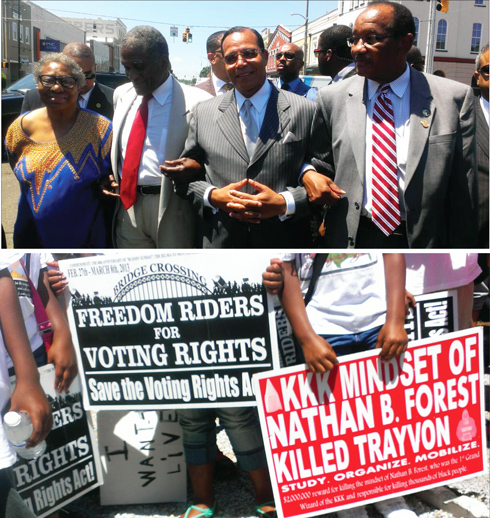
(top) Minister Farrakhan crosses the historic Edmund Pettus Bridge with Tuskegee Mayor Johnny Ford (left) and Selma Mayor George Patrick Evans (right). The bridge was the site of the infamous “Bloody Sunday” of 1965. (bottom) Many youth participated in the rallies throughout the state June 14 holding signs.
|
“Alabama has been the center of the voting rights struggle, and it has become a symbol of the voting rights struggle and we have to save Section Five because it is the heart of the Voting Right Act. To have Min. Farrakhan come and stand with us in this fight to save Section Five and the Voting Rights Act is so important,” said Sen. Sanders.
The 70-year-old veteran of the civil rights struggle said some Jewish organizations and Black Christian ministers expressed displeasure with organizers for bringing the Nation of Islam minister to Alabama.
“A few of their minds have been poisoned but we don’t worry about that,” said Sen. Sanders. “Those who get in the way, we ask them to get out of the way, if not, we’ll run over them.”
“We cannot depend on the government to protect our voting rights. We are going to have to organize and protect them ourselves as Black people, and if we don’t organize and protect them, we are going to lose them because it’s a part of the government that’s trying to destroy them—in this instance, it’s the Supreme Court,” said Sen. Sanders.
Tuskegee Mayor Johnny Ford told The Final Call there was no hesitation from Minister Farrakhan when asked to be a part of this caravan and voting rights efforts.
“We were all so proud when the Minister registered to vote many years ago and voted, and that inspired millions of Black people everywhere when they saw Minister Farrakhan because he has so many followers, and for him to register and vote just sent positive shockwaves across the Black community, and that’s why we decided that we needed a man who was able to mobilize a million Black men in Washington D.C., to be a part of this effort,” said Mayor Ford. “If we are Black and in America, the Voting Rights Act is important to us.”
Thousands of Black elected officials have benefitted from the Voting Rights Act and combatting threats to the act requires rising above political, ideological or religious differences, Mayor Ford added.
“We have come together as one unified force for good,” said the political leader, who also represents the World Conference of Mayors. “Many of those people who stand on the sidelines and criticize and try to cause us to take our eyes off the prize—forget it. We’re together baby, and we’re going to stay together.”
Mayor Ford shared how allies include Chokwe Lumumba, who was recently elected mayor of Jackson, Mississippi, Chokwe Lumumba, the Rev. Jesse Jackson and a host of other organizations.
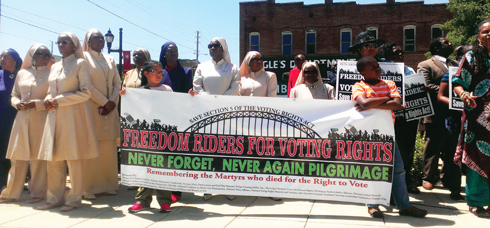
Members of the MGT&GCC from throughout the Southern Region did their part to make the day’s events successful.
|
Tuskegee NAACP leader Barbara Howard barely contain her enthusiasm as she told The Final Call she is ready to fight for the constitutional right to vote. She is a 1960s “Freedom Child” who fought for civil rights in Montgomery with Rev. King and Rev. Bevel. “The vote is precious. We won’t forget what it was like not having the right to vote,” said Ms. Howard. “No, we won’t go back. We have a lawsuit in federal court, and I asked to be one of the plaintiffs, if not representing in my position president of the NAACP in Tuskegee, Macon County, then individually to be a force for my people.”
“Today, I can honestly say, if it was not for Minister Louis Farrakhan, the SCLC would be out of business. I feel so good because when we didn’t have any money, when the lights were off, when the folks thought that we couldn’t do it,” Southern Christian Leadership Conference president Dr. Charles Steele said. “I made a call to Chicago.”
According to Mr. Steele, Min. Farrakhan asked him to come to Chicago with longtime civil rights leader Rev. Joseph Lowery. “He prayed for us, he blessed us, and then he said ‘by the way I want to write you a check to take back to Atlanta.’ The rest is history! We raised over $20 million after Louis Farrakhan blessed us and gave us the infusion of some money! But what I really like about him is that he don’t fool with no scared negroes! A scared negro will get you killed!”
“This is not the movement for scared folks! This is not the movement for Uncle Toms!” said the outspoken Dr. Steele on the steps of the Shelby County courthouse in Columbiana, Ala.
A Caucasian woman, Gabrielle Brown, spoke at the rally in support of Section Five and complemented the activists for their determination. Her grandfather was a member of the Ku Klux Klan and her great-grandfather was a Nazi. Though she came from a family “full of hate,” Ms. Brown urged marchers to continue to reject the evil of discrimination. “This is a right. These are things that people try to take from us and they just make it seem like it’s not a big deal. It is a struggle that we will always have,” said Ms. Brown.
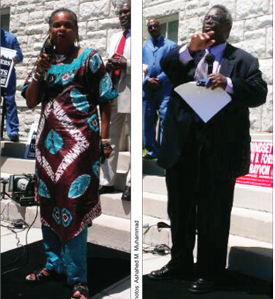
Atty. Faya Rose Touré and Senator Hank Sanders (D-Selma), primary organizers of the Save Section 5 Voting Rights pilgrimage and caravan. Photos: Ashahed M. Muhammad
|
“They choose to put their hate on the Minister because he is a man of truth. One thing that America is scared of is the truth. A man that speaks the truth in this country will be killed or demonized,” said Atty. Toure. “Who is this man that causes so much alarm? We must remember that they treated Dr. King the same way. They will not divide us from one of the greatest leaders that can lead us to the Promised Land.”
On the steps of the courthouse, with curious onlookers peeking out of upper level windows, Min. Farrakhan said the reason the world is filled with so much insanity, pain and conflict is because many are deprived of justice. “We have courts so that human beings that have grievances may bring their grievances before a court, that justice may be dispensed in order that peace may be secured in that community,” said the Minister. “If there is no justice, then there can’t be peace and there can’t be racial harmony that America needs in order to survive.”
Crossing the Edmund Pettus Bridge
The third stop was Selma, Ala., and the Edmund Pettus Bridge, the site of “Bloody Sunday.” On March 7, 1965, local and state police officers attacked peaceful civil rights demonstrators during a voting rights march to Montgomery. When the Minister spoke at Tuskegee University in March, he met with 102-year-old Amelia Boynton-Robinson who was beaten there.
Though some expressed concern about the 80-year old leader speaking at several caravan stops in the heat, Minister Farrakhan showed no signs of tiring. He locked arms with Tuskegee Mayor Ford and Selma Mayor George Patrick Evans striding spryly and confidently across the iconic bridge, which was declared a landmark in March 2013.
“Slogans won’t get it, songs won’t get it. What are we willing to do to make sure that our life, blood and our sacrifice is not turned back and that those that sacrificed that we’d have the right to vote will not be disappointed in us because we sang, we shouted but we refused to work together to change the reality?” the Minister said. “This is our time! This is our day and we cannot allow our former slave masters and their children to dictate how we respond to one another. …When you stand up, they’ll sit down. When we stand up, they’ll step aside.”
A successful end in Montgomery
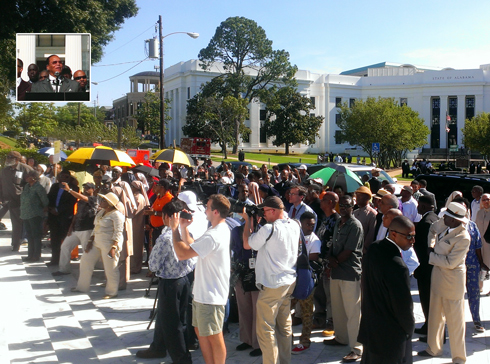
Full media contingents showed up at every caravan stop and so did concerned members of the
community.
|
The last stop was Montgomery. Upon arrival, Minister Farrakhan stood on the steps of the Alabama State Capitol, the same place where Dr. Martin Luther King, Jr. gave his famous speech, “How Long, Not Long” at the end of the Selma to Montgomery March in 1965. The Voting Rights Act was passed six months after that speech.
His comments on the steps of the Capitol were his longest of the caravan, speaking for about 45 minutes. “Some who spoke of me said ‘he’s fearless,’ ‘he’s courageous.’ I’m no more than you. Whatever I am, you have the power to be. I am what I am because I am in love with you and it is perfect love that casteth out fear,” said Min. Farrakhan. “When you love God with all your heart your soul your mind and your strength, and you love your brother or sister as you love yourself, then you are willing to stand for them, you are willing to sacrifice on their behalf.
“I’m not one of those kind of shepherds that when the wolf comes, they run away, for that kind of shepherd, the scripture says, is a hireling, people that are in this for money, but not to change the reality of our condition in America or wherever we are found on the earth,” he said.
INSIDE STORIES AND REVIEWS
-
-
About Harriett ... and the Negro Hollywood Road Show
By Rabiah Muhammad, Guest Columnist » Full Story -
Skepticism greets Jay-Z, NFL talk of inspiring change
By Bryan 18X Crawford and Richard B. Muhammad The Final Call Newspaper @TheFinalCall » Full Story -
The painful problem of Black girls and suicide
By Charlene Muhammad -National Correspondent- » Full Story -
Exploitation of Innocence - Report: Perceptions, policies hurting Black girls
By Charlene Muhammad -National Correspondent- » Full Story -
Big Ballin: Big ideas fuel a father’s Big Baller Brand and brash business sense
By Bryan Crawford -Contributing Writer- » Full Story






 Click Here Stay Connected!
Click Here Stay Connected!








